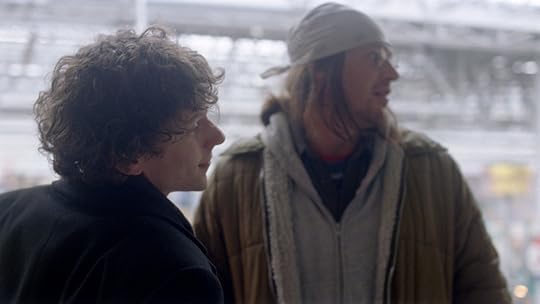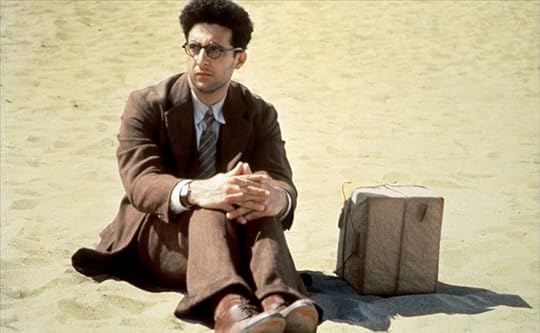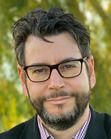Becoming Yourself: </i#x3E;

Last night I went down to the majestic Music Box Theatre for a Chicago Film Critics Festival screening of James Ponsoldt's new film The End of the Tour, a film based on David Lipsky's book about the five days he spent interviewing David Foster Wallace for a Rolling Stone profile that was never published. It's a subdued and plotless film, anchored for this viewer by its deadly accurate portrayal of the neuroses and egos of two writers, one of whom is wildly successful (but profoundly fragile), the other overflowing with a toxic blend of reverence and envy, wielding a handheld tape recorder sometimes like a shield, sometimes like a dagger.
Films about writers are notoriously hard to pull off: there's nothing visually interesting about watching someone sit at a keyboard or scribble in a notebook or stare thoughtfully out of windows. Ponsoldt's way around this is first of all not to have made a conventional cradle-to-grave biopic, though the film is framed by the news of Wallace's suicide and Lipsky's response to it, which results in his book Although Of Course You End Up Becoming Yourself: A Road Trip with David Foster Wallace. Ponsoldt takes his cue from Lipsky and gives us a kind of buddy movie in which the buddies can't erase a mutual suspicion of each other's motives, even though as nerdy white guys with a literary bent they are more similar to each other than not. The film is devoid of literary content as such, but the glimpses we get of a writer's life on and off the road--the room full of his own books, the cheerfully indifferent local publicist (mischievously performed by Joan Cusack), the readings whose attendance or lack thereof is precisely indexed to the author's fame--are instantly recognizable to anyone who's ever published a book.

The only other film I can think of that's as successful at portraying what it's like to be a writer in America (which is very different from portraying writing) is Barton Fink. The Coen brothers, of course, are scabrous and satirical where Ponsoldt is more gently rueful, but both films do a remarkable job of conveying the peculiar mix of grandiosity and self-loathing that afflicts most of the writers I've known. The two Davids of Ponsoldt's film curiously parallel the roles played by the two Johns (Turturro and Goodman) of Barton Fink: it's as though they take turns revealing to each other their most fragile aspirations and the terrible obstacles to realizing them. I'll show YOU the life of the mind!
I have never been a member of the DFW cult, though I love some of his essays, but the film confirms in me mingled feelings of affection, protectiveness, and sadness for the man. Jason Segel's performance is marvelously subtle, completely recognizable without being an impersonation, and he conveys a tremendous amount of mental activity between and to one side of the stream of words he spills (mostly taken, Ponsoldt says, word for word from Lipsky's tapes). Jesse Eisenberg is more typically Jesse Eisenberg-ian--in the Q&A Ponsoldt said he reminded him of Ratso Rizzo--which makes him all the more painful to identify with, as I inevitably did, in his desperation to have something of Wallace's genius and success somehow rub off on him.
There's an amazing scene toward the end when Lipsky, left alone for a moment in Wallace's shambling one-story ranch house, runs around with his tape recorder to his lips itemizing the objects and furnishings ("a bookish frathouse" is his accurate summary). It's a creepy, stalkerish move, but in the film it resonates with love and poignance, particularly for we the viewers who also wish we could capture the man, now lost to us forever. Loss is woven into the texture of the film--there's an early shot of 1998 New York with the Twin Towers in it, and this is paired with a scene later on in which Wallace muses presciently to Lipsky about what would be terrible enough to make someone want to jump from a burning building. I was reminded somehow of Man on Wire, a film for which 9/11 provides a ghostly frame, though the event itself is never mentioned.
There's something undeniably ghoulish about the film's Lipsky: at the end of the film we see him reading from his book about Wallace to a much fuller room than the one to which he read from his own novel at the beginning. He has elbowed his way into the DFW story and become inseparable from it: reality hunger, indeed! I can't help but read this as a comment on how the literary stakes have shifted in the past twenty years: prestige no longer lies with the postmodern phantasmagoria of long novels like Infinite Jest but with the postmodern transparencies of books that blur the line between fiction and nonfiction (I think inevitably of Karl Ove Knausgaard, whose six-volume My Struggle could not only beat up Infinite Jest in the playground but surround it, the way the Sinister Six surrounds Spider-Man). Is this the zombification of fiction? Or just an honest account of how anyone becomes a writer: by seeking to absorb the spirit of whatever other writer first began to make writing seem like a living possibility?
In a way, you're much luckier to cathect upon a dead giant like Joyce or Woolf than if you fall for a living writer: you will never catch up with the great dead until--maybe--you are dead yourself. (I think of Jack Spicer's famous last words to Robin Blaser: "My vocabulary did this to me--your love will let you go on.") Lipsky is done for the moment he reads Infinite Jest (there's a sharp early scene where we see him reading it, wanting to dismiss it, and then resigning himself to its brilliance with a simple sudden "Shit!"); is it maybe the case that he can only become himself as a writer once Wallace is dead? I will probably have to read his book to find out.



